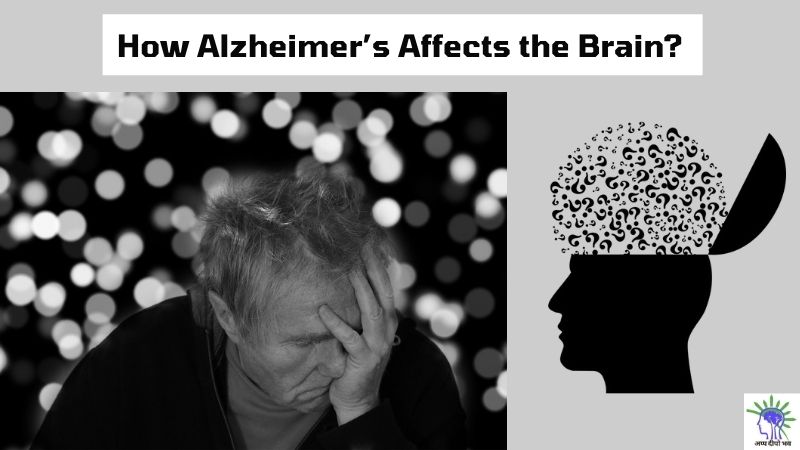If you are curious to know how Alzheimer’s affects the brain, you have come to the right place. Moreover, immediate help in case of immediate help, Dr. Vivek Pratap Singh can guide you with the best treatment for your condition. He is one of the most known Psychiatrist in Patna.
Alzheimer’s disease is a neurologic ailment that causes the brain to shrink (atrophy) and the death of brain cells. It is the most frequent form of dementia, which is defined as a progressive loss of cognitive, behavioral, and social abilities that impairs a person’s capacity to operate independently. Forgetting recent events or discussions is one of the first indicators of Alzheimer’s disease.
Let’s start off with some background history on the disease itself.
History of Alzheimer’s Disease
Alzheimer’s disease is named after Alois Alzheimer, a German doctor. In 1906, he documented the symptoms of a patient named “Auguste D.” Memory loss, odd behavior, and brain shrinkage were among the symptoms.
In a 1910 medical book, psychiatrist Emil Kraepelin, Dr. Alzheimer’s colleague, invented the term “Alzheimer’s illness.”
High levels of two proteins, beta-amyloid, and tau are the major indicators of Alzheimer’s disease in the brain.
In 1984, beta-amyloid was identified. Tau tangles were detected in persons with Alzheimer’s disease two years later. Both proteins have the potential to harm brain cells. Researchers aren’t sure if high amounts of beta-amyloid and tau cause Alzheimer’s disease or if they’re signs of the disease.
Now, let’s find out what and how Alzheimer’s affects the brain.
Causes of Alzheimer’s disease
Alzheimer’s disease is a disease whose specific causes are unknown. However, at a fundamental level, brain proteins malfunction, disrupting the work of brain cells (neurons) and triggering a cascade of harmful events. Neurons become injured, lose their connections, and eventually die.
- Plaques – A portion of a bigger protein, beta-amyloid, is found in the brain. These pieces appear to have a deleterious effect on neurons and disrupt cell-to-cell transmission when they cluster together.
- Tangles – Tau proteins are involve in the movement of nutrients and other critical components within a neuron’s internal support and transport system.
However, above all, what lobes of the brain are affected by alzheimer’s effects might be the common query added by you. To answer that, Alzheimer’s disease is defined by damage to the temporal lobe of the brain, which frequently spreads to other areas.
After knowing about the cause of’s Alzheimer, let’s take a quick look at how Alzheimer’s affects the brain.
Note: If someone in your family is suffering from Alzheimer’s, then you need to provide them the treatment from the best Psychiatrist in Patna i.e, Dr. Vivek Pratap Singh.
Pathophysiology of Alzheimer’s Disease
A little portion of a larger protein called “amyloid precursor protein” is beta-amyloid (APP). Scientists do not yet know what APP’s typical role is, but they do know a lot about how it looks to work. APP travels from the interior of brain cells to the outside by passing through the fatty membrane that surrounds the cell in its whole form.
It builds up in stages into minute amyloid plaques, which are a hallmark of an Alzheimer’s-affected brain. Small clusters called oligomers form initially, followed by chains of clusters called fibrils, and finally “mats” of fibrils called beta-sheets. Plaques, which contain clumps of beta-sheets and other chemicals, are the ultimate stage.
However, with this, you came to know what causes Beta-Amyloid Plaques. However, the brain changes with the age. So, it makes the condition divide into different areas and factors.
Types of Alzheimer’s Disease
As of the recent studies, there are three types of Alzheimer’s disease:
- Alzheimer’s disease with a young-onset. This is a kind that affects people under the age of 65. It is more common in people with Down syndrome.
- Alzheimer’s disease with a late-onset. This is the most common type of dementia, which affects persons aged 65 and up. It could run in families or not.
- Familial Alzheimer’s disease (FAD) is a type of Alzheimer’s disease that has been link to genes by doctors. At least two generations of individuals of affected families have had the condition.
Therefore, let’s see what can be the related symptoms of the condition can be.
Symptoms of Alzheimer’s
The difficulty of remembering new knowledge is the most prevalent early indication of Alzheimer’s disease. Our brains, like the rest of our bodies, evolve as we get older. Most of us eventually feel some sluggishness in our thinking and occasional difficulties remembering specific details.
Serious memory loss, disorientation, and other big changes in the way our minds work, on the other hand, could indicate that our brain cells are deteriorating.
Dr. Vivek Pratap Singh: Best Known Alzheimer Doctor in Patna
Dr. Vivek Pratap Singh, a neuropsychiatrist in Patna who also works as a Day-care Deaddiction Specialist, is a young and active neuropsychiatrist. He is a neuropsychiatrist and the first psychiatrist in Eastern India to complete his psychiatric residency and graduate with a degree in neurology. He is also a pioneer in the field of child and adolescent psychiatry and an expert in the field.
Above all, he has garnered various awards and prizes for his services to the field of neuroscience as Patna’s top neuropsychiatrist. He has good experience in his field and provides the best Alzheimer treatment in Patna.
So, here we come to the end of our blog on how Alzheimer’s affects the brain. If you are having any other related questions on the topic, do let us know in the comment section below.
